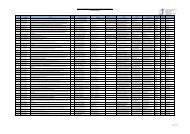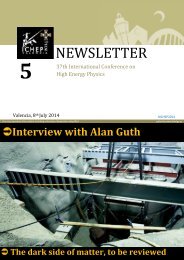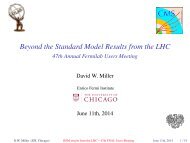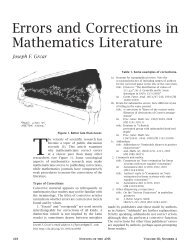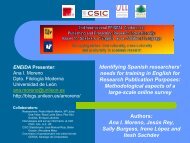PW_mar13_sample_issue
PW_mar13_sample_issue
PW_mar13_sample_issue
You also want an ePaper? Increase the reach of your titles
YUMPU automatically turns print PDFs into web optimized ePapers that Google loves.
GraduateCareers<br />
The pleasure of finding things out<br />
The ability to research a problem<br />
is one of many “soft skills” that<br />
serve physics graduates well<br />
in the job market, as<br />
Nadya Anscombe describes<br />
Many students choose to do a physics<br />
degree because they like learning about<br />
how the world around us works. Fortunately<br />
for those about to enter the job market as<br />
new graduates, the natural curiosity that is<br />
a prerequisite for studying physics is also<br />
a prerequisite for many professions, even<br />
those that appear to have little connection<br />
with science. Finding information, sifting<br />
through it and extracting the important<br />
bits are all skills that are needed in finance,<br />
market research, politics, police work and<br />
journalism – to name just a few.<br />
It is widely accepted that physics graduates<br />
tend to be numerate, bright and well<br />
informed about some pretty esoteric subjects.<br />
In many workplaces, though, it is their<br />
critical thinking skills that are in demand,<br />
says Peter Barham, a physicist and senior<br />
tutor at the University of Bristol who has<br />
seen hundreds of students enter the job<br />
market over the years. “Many jobs, such<br />
as patent examiner or business consultant,<br />
require someone to collate a large amount<br />
of information and act on it,” he explains.<br />
“That’s basically what physics is all about”.<br />
Considering the source<br />
One aspect of finding information is, of<br />
course, having good formal research skills.<br />
During your degree, you were probably<br />
taught how to carry out simple open-ended<br />
experiments, use the library and mine various<br />
databases for information. However,<br />
many of the research skills you will find<br />
most useful in your future career are those<br />
you picked up almost without realizing it.<br />
One of these, Barham suggests, is simply<br />
being able to find the right person to talk to.<br />
“When setting assignments, we try and set<br />
questions that cannot be answered by doing<br />
a Google search,” he says. “We encourage<br />
students to knock on doors and ask for<br />
68<br />
advice. We also encourage them to talk<br />
to students in higher years as part of our<br />
‘parenting’ system”.<br />
Being able to glean information from<br />
people is a particularly important skill for<br />
journalists. Valerie Jamieson, who is now<br />
features editor at New Scientist magazine,<br />
chose to study physics at the University<br />
of Glasgow because she felt it would give<br />
her skills in many areas. Today, she uses<br />
research skills she learned during her<br />
undergraduate degree and her PhD to<br />
help her find out the “very human stories”<br />
behind scientific results.<br />
Another important – and related – skill,<br />
Jamieson says, is being able to analyse the<br />
information once she uncovers it. “In my<br />
job, I see a lot of press releases, and sometimes<br />
press releases can overblow the significance<br />
of results, which can go on to get<br />
reported,” she explains. “Understanding<br />
the scientific method, how results get presented<br />
and what uncertainties mean really<br />
helps me to decide whether a story really<br />
is as significant as it is cracked up to be. It<br />
makes you better informed.”<br />
Research skills of this type are valued in<br />
the commercial world, too. For example,<br />
companies looking to hire new employees<br />
Many of the skills you will find most useful<br />
you picked up almost without realizing it<br />
physicsworld.com<br />
may look favourably on applicants with<br />
strong research skills – even if research<br />
as such is not part of the job description –<br />
because they tend to require less time and<br />
money to train, and will use their own initiative<br />
to start providing new ideas quickly.<br />
Graduates who have good research skills<br />
are also likely to be able to improve products<br />
and services quickly. For example,<br />
project-based work may require research<br />
skills to get a project off the ground.<br />
Know your strengths<br />
In the finance industry, skills such as analytical<br />
thinking and problem solving are<br />
always useful. When William Van De Pette<br />
graduated from the University of Oxford,<br />
he knew he did not want to work in physics,<br />
but he wanted a job where he could apply<br />
the skills he had learned during his physics<br />
degree. Today he is a portfolio manager at<br />
investment management group Henderson<br />
Global Investors in London. “During my<br />
degree I gained skills in research, analytical<br />
thinking and problem solving, and these<br />
are now skills I use every day in my job,”<br />
Van De Pette told Physics World. “I often<br />
have to take maths problems and translate<br />
them into real-world solutions. For this I<br />
use problem solving strategies I learned<br />
during my undergraduate years. I also frequently<br />
have to find information by talking<br />
to people, by e-mail and by reading reports,<br />
and then make investment decisions based<br />
on what I find out.”<br />
A generalized “ability to find things out”<br />
Physics World March 2013<br />
iStockphoto/David H Lewis



